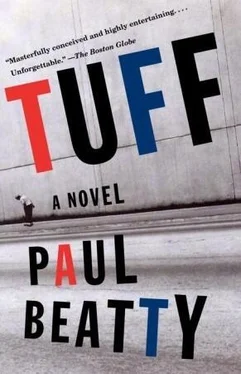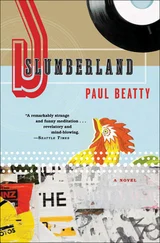“You want to make money,” blurted out Fariq.
“True.”
“You want to set a good example for your son,” suggested Yolanda, refilling Jordy’s baby bottle with apple juice and sliding it down the table as if it were a mug of beer in a saloon. Winston sipped from the bottle, then handed it to the baby.
“Sure, you right.”
“You want to emulate them,” Inez said, pointing to a set of posters including Ho Chi Minh, Marx, Menelik II, and Emma Goldman, lined up on the wall like a radical Mount Rushmore.
“If you say so,” Winston teased, looking over at the posters. “Who’s that?”
“Which one?” asked Inez.
“The one at the end — the crazy-looking white man.”
“That’s Eugene V. Debs. He was a labor leader at the turn of the century. He ran for president a few times too.”
Winston stared at the black-and-white photo of the bald, craggy-faced agitator. Eugene Debs was standing on an unseen soapbox, leaning over a sea of people like a figurehead lashed to a frigate bow, his fist beating the air, his mouth open in mid-mandate. You could almost hear the rabble rouser begging the crowd to overturn everything from corporate oligarchy to the horizon. The blown-up photo of Debs’s exhortations reminded Winston of himself: the pushy nigger who threatened and bitched and moaned and fought until he got his way. “That old motherfucker look like he about to have a heart attack. Nigger better calm down.”
Inez nervously tugged on one earlobe. “Winston, you’ve mentioned money, family, social activism as possible goals and aspects of your life you want to work on. Where do you plan to start?”
“Right here with my seed,” he answered, lifting Jordy up by the scruff of the neck like a mother lion lifting her cub. “This little nigger here is my first responsibility.”
“I don’t think so.”
“What do you mean, Ms. Nomura? I ain’t got to take care of Yolanda — she grown, she can look out for her own self.”
“Winston, it’s like being on an airplane.”
“I never been on a plane.”
Winston knocked his fist on his forehead and let out a groan. “I fell into one of your moral traps, didn’t I? Go ahead, tell me what happens on a plane.”
Inez winked. “Well, when you board the airplane they wait until everyone is seated; then the flight crew shows the passengers a safety video: how to fasten your seat belt, where the closest exit is, the life jacket is under the seat. Then on the screen are a mother and child sitting side by side. The narrator says, ‘If the cabin pressure falls, yellow oxygen masks will drop from directly overhead. Place one over your head and breathe as you would normally.’ ”
Fariq objected. “How can you breathe normally? If the plane is fucking going down, you’d be hyperventilating and shit.” Inez offered Fariq a cigarette, hoping the smoke would occupy what little air he had in his asthmatic lungs. When Fariq started coughing, she continued.
“The narrator goes on to say, ‘If you are traveling with a small child, put on your mask first, then place the mask on the child.’ ”
“You trying to say I have to be responsible for myself first before I can do anything else?”
“Exactly.”
Yolanda folded her arms and sat back in her chair, bottom lip protruding. “Dag, Winston, I’ve been trying to tell you the same thing for the past year. Why when Ms. Nomura says it, instantly you understand?”
“It’s not her saying it; it’s when and where she said it. You say it right after we’ve had sex. I’m not really listenin’ to your ‘Honey, when are you going to learn’ shit. I’m rubbing my dick against your thighs trying to get another hard-on.”
“Tuffy!” Yolanda screamed, slapping the table in an effort to keep from laughing. Winston apologized with a kiss on the cheek. Although he hadn’t fully answered the question of what he wanted to do with his life, in deciding to take responsibility for himself he felt he’d made some progress.
However, the unavoidable, but rarely acknowledged, corollary to the what-to-do quandary loomed unspoken in everyone’s mind as they watched Winston wolf down the rest of his lunch. Winston knew what they were thinking. Now that I’ve said I’m going to do something, the real question is what can a high-school-dropout short-tempered nigger like me do? I ain’t starting over. No way . Using his thumbnail he picked at a piece of meat lodged in his teeth. “So I suppose I have to get a job?”
Winston spun about in his chair and looked at the cork job board on the wall behind him. Nestled among sheaves of multicolored flyers, the job board promoted everything from political rallies to a charity sumo demonstration in a local park to the candidates running in the upcoming election. Thumbtacked to the board were the job listings. Written with black felt-tipped pen on yellow three-by-five index cards, the listings were neatly arranged in columns under the headings Clerical, Child Care, Service, and Miscellaneous. Winston shuddered, thinking of the last time he’d found himself face-to-face with the dreaded job board.
Just after Jordy was born, Winston, feeling the pressures of an extra mouth to feed, joined up with a chain-snatching ring that operated in the tony Chelsea/West Village area. Although the baby was good subterfuge, he quickly tired of lugging Jordy to work with him, but was averse to leaving him at the day-care centers in his neighborhood. He couldn’t bring himself to entrust his child to places that sounded more like halfway houses or reclamation institutions than nurseries: Bridge the Gap Day Care, Family Restoration Through Faith, Empowerment House, Sheltering Arms Children’s Service. Even Ms. Nomura’s day care at the community center was called the Crack Is Wack Children’s Center. Winston wanted to drop Jordy off at one of the Chelsea spots he passed while running from the cops — child-care centers whose names seemed to emphasize preparing kids for the future: the Multimedia Preschool, the Piaget Discovery School. The implied mission of the other nurseries was simply allowing children to be children: the Acorn School, City and Country School, Kids Curious, and Buckle My Shoe. Winston had fixated on Buckle My Shoe. To him it sounded like a luxury rumpus room where the staff called the kids “toddlers” and “youngsters,” not “clients” and “crumb snatchers.” He’d seen the name somewhere before. The job board!
The index card termed the position as “custodial in nature,” one day a week, and ten cents over the minimum wage. Winston accepted the job, negotiating free child care two days a week for Jordy in return for an eighth of top-grade marijuana a week. On his first Tuesday, at precisely one-thirty, while Winston was cleaning the windows, Diedre Lewis, his supervisor, took a break to smoke her weed on the roof. “Watch my kids for me, Mr. Foshay.” The moment Diedre left the room, all fifteen brats started wailing like tripped-up security alarms, and no amount of cradling, lullabies, or “Aw, there now”s would silence them. Next Thursday, on his way to work, Winston grabbed a crusty brown bottle from the medicine cabinet — a bottle he hadn’t opened since his dognapping days. That afternoon when Diedre went on break, the kids cried like beaten seals. Winston twisted the cap off the bottle and poured the clear, dense liquid onto a cleaning rag. Shaking a box of Chiclets as if it were a hunting rattle, he lured Kyle Palmetti into striking distance. Quickly, Winston pounced on the boy, covering his mouth and nose with the towel. The child fell instantly into a deep sleep. Instead of fleeing after seeing one of their brethren incapacitated, the other kids clamored to be next. “How’d you do that?” “Do me next.” “No, me!” “Me!” When Diedre returned from her break, the entire brood were asleep in their cubbyholes. Winston sang the latest radio hit to himself and ran his squeegee over the windows. “How?” she asked.
Читать дальше












